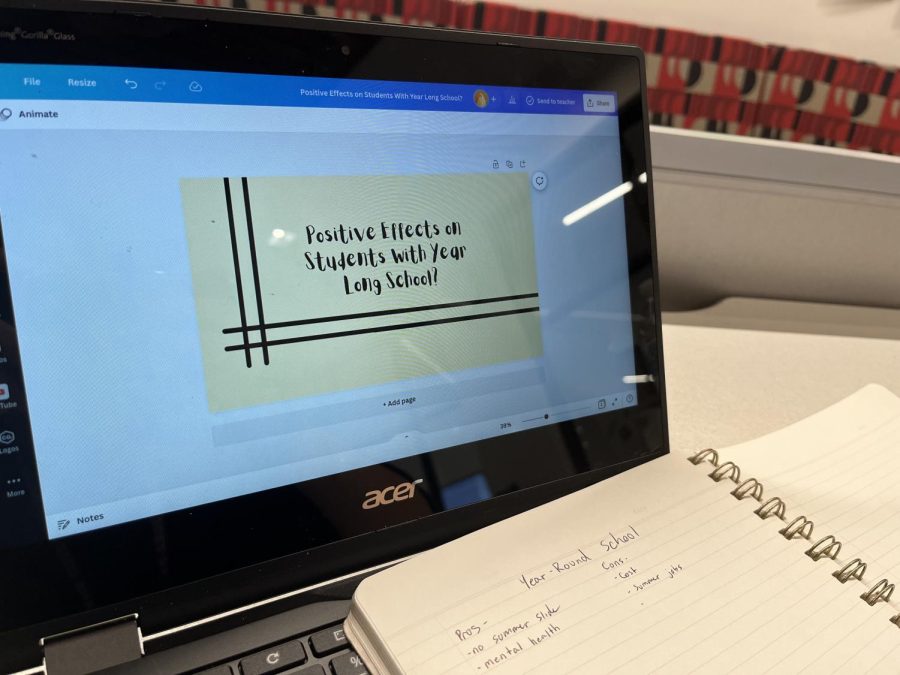Change to year-round system could help students
Planning Ahead. Notebook shows different advantages and disadvantages of a full-year school system. The debate has arguments both in favor and against full-year school.
September 27, 2022
The Pennsylvania Department of Education states that every school in the state of Pennsylvania must be in session at least 180 days. One thing that’s not specified is how these 180 days are broken up throughout the school year.
Similar to a majority of the schools in the United States, Altoona has become familiar with a traditional school year. Having around nine consecutive months with two or three months that make up summer break. After looking at the effects that come with year-long school, it’s not hard to see how it could be more effective towards a better education to not schedule the break all at once.
A year-long school year set up would still contain 180 school days of education, but it would be broken up differently throughout the year. One type of layout for all-year schooling would be six weeks of school days, followed by two weeks of a break and so on. This would eliminate a long summer break, but would let students experience a smaller break every season.
One of the reasons why summer vacation is such a big part of America’s school system is because of how important agriculture was to the country. Many students needed to take the summer off in order to work for their family farms. Nowadays, that simply isn’t needed anymore. There are some farms that surround our area, but it isn’t as prevalent as it used to be. It makes summer vacation no longer necessary for us.
One of the most common reasons why people think year-long schooling would be a good idea is because it helps lower an occurrence known as summer slide: A tendency that students end up having where they forget or get rid of a lot of the information they learned from the year before their summer break. This often leads teachers in certain subjects to have to review some topics in order to make sure their students are on the right track academically.
“I think, from a mental perspective, it would be better because you would have these natural breaks for you to take a little bit of time off,” Principal Andrew Neely said
Mental health is another concern that comes with the current school year set-up. A year-round system could help make an improvement in student’s mentalities. Having more smaller breaks throughout the year can let students avoid overworking themselves, instead of the students consistently working week after week. This will allow students to relax and unwind during those two weeks, especially if they’re feeling unenergized and unmotivated because of school.
These breaks could also motivate students while improving their work ethic. If there is a goal set for people to look forward to, then it could make them want to work harder and more efficiently. Similar to Christmas or Thanksgiving break, I always see myself focusing more on my schoolwork, because I know, in a few weeks, I’ll be able to relax and not worry about schoolwork as much.
Having breaks throughout the year could also result in fewer absences. It’s not uncommon that whenever students don’t attend school, it isn’t always just because they are sick. Other reasons may be because of a vocational break, or if a student feels as though they need a mental health day. If we were to have seasonal vacations, families would be able to plan around those breaks instead of having students take off school days.
“I sign every single person’s trip request form that comes through…I see all those, and there’s a lot of them. If we had these natural breaks throughout the year, people maybe wouldn’t take that vacation; they could just do it during a normal break. People often go to beach during the summertime, but someone may want to go skiing in the wintertime…And if they do, generally speaking, unless they’re doing it over the Christmas holiday, they’re going to end up taking a couple of things, so it could avoid that as well,” Neely said.
Another benefit of this school system would be schooling kids during the summer. Although Altoona isn’t full of terrible heat conditions, it can get extremely hot on some days. Having school would allow students to hide from the heat, and instead, surround themselves with an air conditioning system. This can be a positive thing for a lot of students, especially if they don’t have access to a cooler place during the summer.
One of the downfalls that comes with year-long schooling is the cost it would bring. Although having school during the summer would allow students to receive a few days of good air conditioning, it would raise the price of some utilities at the school. Even with the schedule continuing to be 180 days long, it’s common for prices to rise during the summer with things such as air conditioning and other electricity utilities. It’s important to acknowledge that this spike in prices doesn’t just happen in the summer. Winter is another popular period where energy prices rise. According to the Pennsylvania Public Utility Commission, by June 1 energy had a rate of around 29.6% increases depending on the supplier. By Sept. 1, the rate increase was around 13.8%. Although September’s increase might seem low compared to June’s, it shows that there is an increase occurring. Additionally, this increase will get higher once energy prices reset on Dec. 1.
Another flaw with this system would be the unavailability of summer jobs for teenagers. There are people who prefer to work only in the summer and not have a job during the school year as it can be too stressful for them. If we were to switch to a year-long school system, then that chance of working only in the summer would be destroyed. There is no perfect fix for this issue and mainly depends on the person. Some people can try out working during the school year because there would be more breaks, so schoolwork wouldn’t completely overload them throughout the year. Others could try only working during the two week breaks, but it can be difficult to find something that is temporary.
Even with these defects, it can be worth it to spend a bit more or change around some schedules since it could help students both academically and emotionally. If students do hold more information and work better during the school year with a year-round schedule, it shows that it is an effective way to break up the school year.
In general, changing our school system to a year-long one has its advantages and disadvantages, but those advantages could help improve the student body’s academic work, participation in school and overall mental health. Changing the school system can help the student body and be a successful change for the school.








Melissa • Sep 28, 2022 at 3:29 pm
What about those that co-parent with someone from another state? Usually the summer is when the other parent gets visitation.
Bryana Ayala • Oct 9, 2022 at 12:59 pm
The other parent could see their child during the seasonal breaks. The time would still add up to the same length as a summer break, but it would just be cut up into four smaller sections.